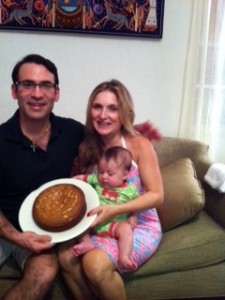 My husband and I were already asleep by midnight this New Year’s Eve. I like to think that’s not because we’re insanely boring but because our baby has been teething, so when she sleeps, we sleep. We did go to dinner, though, beforehand, at an Italian restaurant where the outdoor seating means teething babies are tolerated, or, thanks to the friendly Italian waiters, even welcomed. We reminisced about previous new year’s eves we’d spent apart, in Athens, India, and Nicaragua, and last year’s New Year’s Eve, which we spent together, when I was just pregnant, and no one knew yet, and we watched the fireworks from our friends’ apartment, tired, excited, and a little bit terrified because I had experienced some spotting earlier in the day.
My husband and I were already asleep by midnight this New Year’s Eve. I like to think that’s not because we’re insanely boring but because our baby has been teething, so when she sleeps, we sleep. We did go to dinner, though, beforehand, at an Italian restaurant where the outdoor seating means teething babies are tolerated, or, thanks to the friendly Italian waiters, even welcomed. We reminisced about previous new year’s eves we’d spent apart, in Athens, India, and Nicaragua, and last year’s New Year’s Eve, which we spent together, when I was just pregnant, and no one knew yet, and we watched the fireworks from our friends’ apartment, tired, excited, and a little bit terrified because I had experienced some spotting earlier in the day.

Now here we were on the other side of that hurdle (thank God), with our adorable, wailing baby, trying to decide what to eat. One of the items on the menu was cotechino con lenticchie, or sausage and lentils, a traditional Italian New Year’s Eve dish, because lentils represent money (since they’re vaguely coin-shaped). It’s sort of the same idea as hoppin’ john (black-eyed peas and bits of pork), which is a traditional lucky, money-bringing New Year’s dish in the South. The pork itself is lucky because it’s rich-tasting and also, I learned from an article on Epicurious, pigs symbolize progress because “the animal pushes forward, rooting itself into the ground before moving.” For this reason, Austrians scatter marzipan piggies around the table at new year’s.

Despite the overwhelming magical power of this dish, neither my husband nor I opted for the lentils. But that was only because we had our own cross-cultural magic food up our sleeves. We spent the first of January at the home of Cuban-Greek friends who were having a pig roast (suckling pig being a Cuban new year’s tradition). And then we came home to have our own vassilopita, the Greek new year’s cake that has a coin hidden in it for good luck. My parents served a vassilopita in Massachusetts too (naturally!) and Amalía got the coin in absentia. Our Florida vassilopita was divided into pieces for me, my husband, Amalía, the house (everyone would share the luck) and Christoulis (which is Greek for Papachu, which is Nicaraguan for Baby Jesus). We dangled the cake in front of Amalíaso she could choose her slice, and she slapped her meaty little palm on the largest piece. It also happened to contain the coin, making her lucky twice over.
“It’s sort of too bad,” I told my husband. “To have all this luck when you’re too young to remember it.” When you’re older, there’s so much you want luck to bring you–romance, adventure, career success. Whereas a lucky day for Amalía means multiple relatives to cuddle her and all you-can-suck breast milk, two things she has anyway, most of the time.
My husband just stared at me. He didn’t grow up in a superstitious family and is not used to all this parsing of luck, to him luck is good anytime, and food is for nourishment and pleasure, not for magically influencing fate or changing the direction of the new year. He doesn’t even believe in New Year’s resolutions, arguing that change only comes when you’re really motivated to alter your behavior, not because the date on the calendar has flipped or because everyone else is making themselves over.
But when you lay down with folklorists, you wake up with folklore. I’m slowly starting to alter his worldview, so that even if he doesn’t quite believe you can manipulate your luck, he’d rather be safe than sorry. He once told me that before he met me, he’d never heard of the Evil Eye, the idea that others might compliment your adorable baby or shiny new car or great hairstyle and inadvertently, by pointing out your luck, curdle it, making your baby cry, your car stall, your hair frizz. You can avoid the Evil Eye, of course, by spitting when you compliment someone (so as not to give it) or wearing protective amulets or saying certain phrases (so as not to receive it). But it’s hard to be ever-vigilant, so I felt a little guilty that I had infected an otherwise positive-thinking man of action with my superstitious views.
Then, last week, while we were in Nicaragua visiting his family, his grandmother’s nurse caught sight of one of Amalía’s dirty cloth diapers we were carrying to the laundry area. “In my neighborhood, the older people say that when a baby’s poop is green like that, it’s because people complimented her too much because she’s so cute.” She shrugged. “The doctors I work with don’t believe in it, but you can cure it using a certain root.”
“What do you call it, this sickness people give by complimenting babies?” my husband asked.
She giggled shyly. “We call it the Evil Eye.”
I felt vindicated. I hadn’t brought the Evil Eye into my Nicaraguan husband’s life. It had been lurking in his cultural subconscious all along. I was starting to feel like a rationalist by comparison.
“Green poop is normal,” I told him. “All the books say so.”
“I know,” he said. “I took the classes too.” He paused. “But maybe you should call your aunt and have her take the Evil Eye off of Amalía; she is pretty cute.”
He’s right. She is cute. So is he. And I consider myself lucky to have had them both snoring along with me as the new year waltzed in. Ftou, ftou (that’s the sound of me spitting).